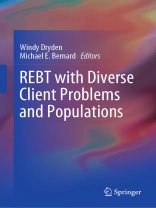This practice-focused resource demonstrates effective uses of Rational Emotive Behavior Therapy methods and techniques in treating clients across various conditions, settings, and subgroups.
Client problems featured include both those often associated with REBT (e.g., anxiety, depression, anger) and others noted for complex presentations, difficulties with engagement, and impasses (e.g., addictions, suicidality, psychosis). Challenging treatment populations are covered as well, including women, couples, families, elder and pediatric clients, clients with disabilities, and sexual minorities. These stimulating cases show how well the diversity of clients and their concerns is matched by the flexibility of techniques and applications within REBT.
In each chapter, expert therapists:
· Identify concepts in REBT especially suited to approaching the problem or population.
· Outline best REBT practices in assessment and treatment of the client(s).
· Survey evidence-based non-REBT approaches most useful in complementing REBT.
· Provide a brief case example representing appropriate REBT in action.
· Assess their use of REBT in treating the problem or members of the population.
A bedrock text for REBT scholar-practitioners, REBT with Diverse Populations and Problems is a testimony to the continuing usefulness of the therapy and its adaptability as client populations emerge and as the contexts of client problems evolve in response to a demanding world.
Spis treści
Part 1. REBT with Client Problems.- REBT and Anxiety Disorders.- REBT and Depressive Disorders.- REBT and Suicide.- REBT and Anger Disorders.- REBT and Eating Disorders.- REBT and Addiction.- REBT and Sexual Problems.- REBT and PTSD.- REBT and Complicated Grief.- REBT and Personality Disorders.- REBT and Psychosis.-
Part 2. REBT with Diverse Populations.- REBT with Children and Adolescents.- REBT with Couples.- REBT with Families.- REBT with Women.- REBT with Religious People.- REBT with Aging Populations.- REBT with LGBTQ Clients.- REBT with Clients with Disabilities.- REBT with Forensic Populations.












